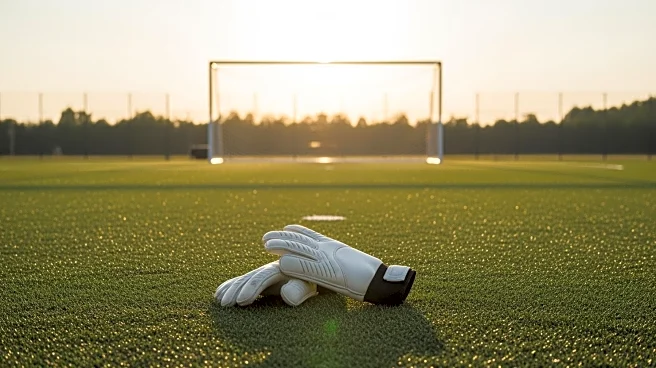What's Happening?
Mia Hamant, a prominent goalkeeper for the University of Washington's women's soccer team, has died at the age of 21 following a battle with kidney cancer. Hamant was recognized as one of the Big Ten's top goalkeepers in 2024, achieving the third-lowest
single-season goals against average in the program's history. Her diagnosis with Stage 4 kidney cancer in April led her to step away from the team to undergo chemotherapy. Despite her illness, Hamant remained a source of inspiration and support within the Washington athletic community, receiving accolades such as the 2025 Sportsmanship Award from the Big Ten. Her coach, Nicole Van Dyke, praised Hamant's spirit and impact on the team, highlighting her joy, courage, and kindness.
Why It's Important?
Mia Hamant's passing is a significant loss to the University of Washington and the broader sports community. Her contributions to the team and her resilience in the face of adversity have left a lasting impact on her teammates and coaches. Hamant's story underscores the challenges faced by athletes dealing with serious health issues and the importance of support systems within sports organizations. Her legacy of perseverance and sportsmanship serves as an inspiration to current and future athletes, emphasizing the values of strength and community in collegiate sports.
What's Next?
The University of Washington and its athletic department are expected to continue honoring Mia Hamant's legacy through tributes and support for cancer awareness initiatives. The impact of her story may lead to increased attention on the health and well-being of student-athletes, potentially influencing policies and support systems within collegiate sports programs. The community's response to her passing may also foster a stronger network of support for athletes facing similar challenges.
Beyond the Headlines
Mia Hamant's battle with cancer and her subsequent passing highlight the broader issue of health challenges faced by young athletes. Her story may prompt discussions on the need for comprehensive health care and support for student-athletes, including mental health resources and medical care. Additionally, her legacy may inspire initiatives aimed at raising awareness and funding for cancer research, particularly in the context of sports.















